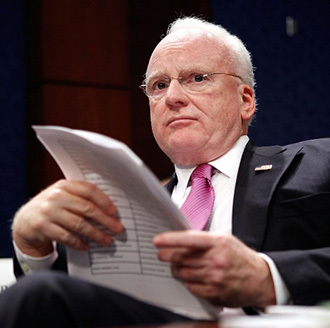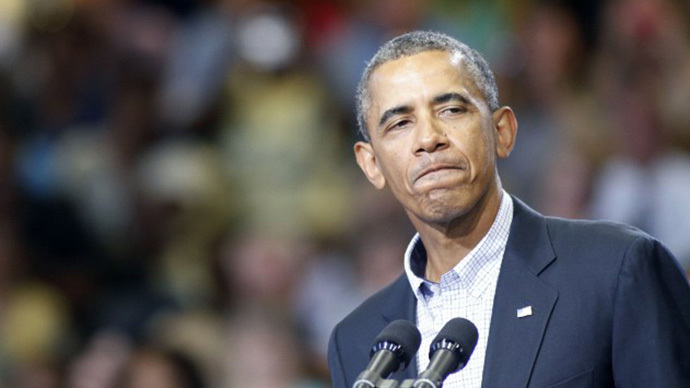Mr. Sunstein might be a good fit on this panel…except for this: a paper he co-authored in 2010 titledConspiracy Theories in
which he warned of the dangers of people who hold conspiracy theories –
and calls on the government to engage in something called “cognitive infiltration” where “government
agents might enter chat rooms, online social networks, or even
real-space groups and attempt to undermine percolating conspiracy
theories.”
In
other words, using government to disrupt the free speech activities of
innocent Americans. And he’s the guy who’s supposed to be caring about
whether or not the NSA is abusing our civil liberties?
http://rt.com/op-edge/obama-nsa-high-level-group-064/
Obama’s NSA review board proving the cynics right

Sam Sacks is a political commentator and journalist, the last five years spent covering politics in Washington, DC.
When
the US Congress wants to pretend to solve a problem, they create a
“Gang of Six” or a “Gang of Eight.” When the White House wants to
pretend to solve a problem, they create a panel – or some sort of
independent review board.
Case
in point, the White House’s recent problems with the NSA. At a press
conference earlier this month, President Obama promised to form “a high-level group of outside experts to review our entire intelligence and communications technologies.”
He said this group will “consider
how we can maintain the trust of the people, how we can make sure that
there absolutely is no abuse in terms of how these surveillance
technologies are used, ask how surveillance impacts our foreign policy.”
This panel of “outside experts” would draft a report by the end of the year for “better understanding of how these programs impact our security, our privacy, and our foreign policy.”
Of
course, the more cynical among us (myself included) immediately
dismissed this idea of an NSA review board knowing full well that review
boards are DC speak for “kick the can down the road.”
And now that we know who’s sitting on this review board of “outside experts,” our cynicisms are well-founded.
The first two outsiders are national security insider Richard Clarke and CIA insider Michael Morell.
Clark served on the National Security Council for President Bush 1, Clinton, and Bush 2 – he wasbasically the counter-terror czar for the White House. Michael Morell spent 33 years working at the Central Intelligence Agency.
He briefed Bush on 9/11. He was alongside Obama when Bin Laden was
killed. And most recently, he was the former Director of the CIA,
stepping down just in March of this year. So he’s been an outsider all
of…five months.
Certainly
these guys have a breadth of knowledge and experience. But clearly,
they’ve spent their careers focused on protecting the United States from
a terrorist attack, not keeping the ACLU content by protecting civil
liberties. Heck, these guys have probably taken advantage of these very
same programs they’re now tasked with reviewing.
So,
half the panel has little background in the flip-side of the security
coin – the privacy side. Which makes little sense considering that
concerns over privacy – and other civil liberties including the First
Amendment’s right to free association – are what started this debate
over the NSA to begin with.
And the next “outside expert” on the panel is former White House insider Cass Sunstein. He was basically the information and regulatory czar – in charge of reviewing federal regulations and, according to WhiteHouse.gov, overseeing federal policies related to privacy and information quality.
Mr. Sunstein might be a good fit on this panel…except for this: a paper he co-authored in 2010 titledConspiracy Theories in
which he warned of the dangers of people who hold conspiracy theories –
and calls on the government to engage in something called “cognitive infiltration” where “government
agents might enter chat rooms, online social networks, or even
real-space groups and attempt to undermine percolating conspiracy
theories.”
In
other words, using government to disrupt the free speech activities of
innocent Americans. And he’s the guy who’s supposed to be caring about
whether or not the NSA is abusing our civil liberties?
But
at least the administration was generous enough to stick one guy on
this review board who does actually give a damn about NSA abuse. The
fourth member of the panel is Peter Swire, a professor at the Georgia Institute of Technology.
Recently, Swire has supported two legal briefs arguing that the NSA’s
mass collection of our metadata is unconstitutional. So, if there’s
going to be someone on this NSA outsider independent review board who’s
an outsider and actually cares about civil liberties, then it’s Peter
Swire. Unfortunately, it’s ONLY Peter Swire.
The
rest are very clearly former national security and intelligence
officials. Oh, and then there’s Cass Sunstein and his fairly far-out
views about “cognitive infiltration.”
In an interview last week with CNN, President Obama admitted that, “the capabilities of the NSA are scary to people.”
He’s
right. He’s presiding over a global security/surveillance apparatus
that’s capable of collecting nearly the entire world’s communications
and metadata, storing all of it, and then searching through it to
conduct everything from lawful anti-terror investigation to downright
scary pre-crime analysis to outright tyrannical Congressional blackmail.
And
we’re supposed to believe that the NSA is keeping within its boundaries
because they have “safeguards” in place. And just in case we’re not
satisfied with the current safeguards, which we shouldn’t be considering
recent NSA leaks showing thousands of abuses every year, the President
is creating this “outside” review board to find any deficiencies and limit abuse.
This
might have worked in the past. But today it won’t. After months of
bombshell leaks showing how our government is going about spying on the
whole world and misleading the American people, the cynics have been
proven right all along. And we can all see right through this
administration’s latest disingenuous gesture.
The
statements, views and opinions expressed in this column are solely
those of the author and do not necessarily represent those of RT.


No comments:
Post a Comment